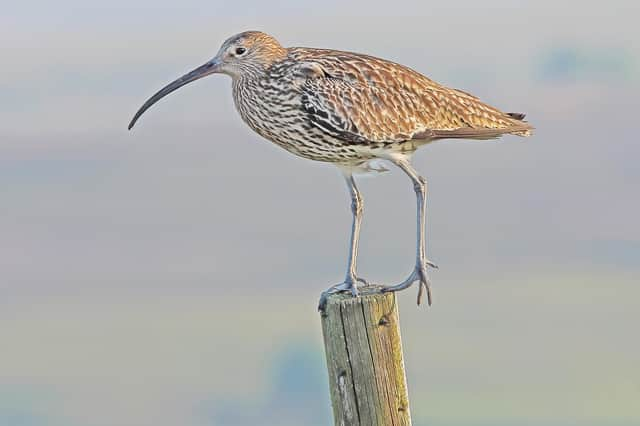Nidderdale landowner wins grant for Curlew project


The Darley Beck Curlew Project will look at reducing the risks of Curlew egg and chick losses to silage production and predators.
Curlews are in decline across the UK. In 2008, the bird was deemed of global conservation concern and listed as ‘Near Threatened’ on the Red List of Threatened Species.
Advertisement
Hide AdAdvertisement
Hide AdMatthew Trevelyan, Farming in Protected Landscapes Officer (FiPL) at Nidderdale AONB, said: “Nationally, the UK’s nature is under threat, with 41 per cent of species in decline.
“A local landowner, Clive White, came to us concerned the breeding success of curlews was limited in the Darley Beck Catchment by early grass cutting and predation.
“Landowners and farmers are on the frontline as custodians of the land juggling commercial pressures. Clive has done amazing work fostering partnerships and the permissions to survey land from other farmers.”
The farmers who have signed up for the first year have committed to permit bird surveyors to go on their land to perform a detailed survey of breeding curlews.
Advertisement
Hide AdAdvertisement
Hide AdThis survey will provide baseline data on the current breeding success of curlews in the area.
It will also provide information on the relative effects of predation and farming activities, such as livestock grazing and silage harvesting.
Clive White, who has produced suckler beef for 35 years, said: “Producing livestock has given me access to EU environmental grants, which has helped me to pursue my interest in nature conservation.
“It has also taught me how hard it is to make a living stock farming especially given the size of farms in this area: every bit of land has to be fully utilised to give a decent return.”
Advertisement
Hide AdAdvertisement
Hide AdWork will see ten farmers collaborating across a 400-hectare landscape. They will be supported by two ecologists, Chris Tomson and Jackie Smith, who will train volunteers to monitor the curlews, identify nest sites, and record habitat and field management.
Clive added: “It helps that we have Jason Drewery, a tenant farmer and Matt Trevelyan, the FiPL funding officer at the AONB who is also a farmer, on our team.
“Most of the farmers who have joined this cluster, especially the older ones, have noticed the decline in curlew numbers over the last three or four decades and are willing to find out how they might be able to help reverse this decline.”
Matthew Trevelyan has worked for more than ten years on the North York Moors, managing a family farm. He has also worked as a dry-stone waller in the Peak District.
Advertisement
Hide AdAdvertisement
Hide AdMatthew said: “As a farmer, I know that if these projects are farmer led, it will be of great advantage.
“My experience of this fund to date is that, with a little imagination and passion, it can be used to support brilliant and realistic projects that partner farmers with ecologists and conservation organisations.”
The three-year Defra-funded programme aims to support those who live and work in AONBs and National Parks across the UK. Applications are managed by Matthew and a dedicated team at Nidderdale AONB.
Professor Russell Wynn, Director of the Curlew Recovery Partnership, said: “We are delighted that Nidderdale AONB has approved this bid focussing on curlew conservation.
Advertisement
Hide AdAdvertisement
Hide Ad“The hope is this project will kick-start a long-term approach and form a ‘farmer cluster’ supporting curlew conservation, with scope even for habitat creation. We’ll be supporting future initiatives around this.”
The Darley Beck Curlew Project aims to be ready for the 2022 breeding season.
Clive added: “When the surveyors’ results have been collated and assessed we will consult with the members of the cluster to find out what they are able to do to help the curlews, and what kind of financial help they might need to make the required changes to their farming practices.”
Other recently approved projects include a group of dairy farmers who will monitor soil carbon levels and experiment with the new machinery to relieve compaction. A number of projects involve boundary restoration; landowners will be restoring dry stone walls and planting, coppicing and laying over a mile of hedges.
Advertisement
Hide AdAdvertisement
Hide AdTo be considered for a grant, projects must either support nature recovery, mitigate the impacts of climate change, provide better access or engagement with the land, or increase the business resilience of nature friendly farms.
The funding programme is part of the government’s Agricultural Transition Plan.
The programme runs until March 2024 and applications can be entered at any time.
To find out more about eligibility and criteria go to the Nidderdale AONB website at nidderdaleaonb.org.uk. Alternatively email the team at [email protected]
Comment Guidelines
National World encourages reader discussion on our stories. User feedback, insights and back-and-forth exchanges add a rich layer of context to reporting. Please review our Community Guidelines before commenting.